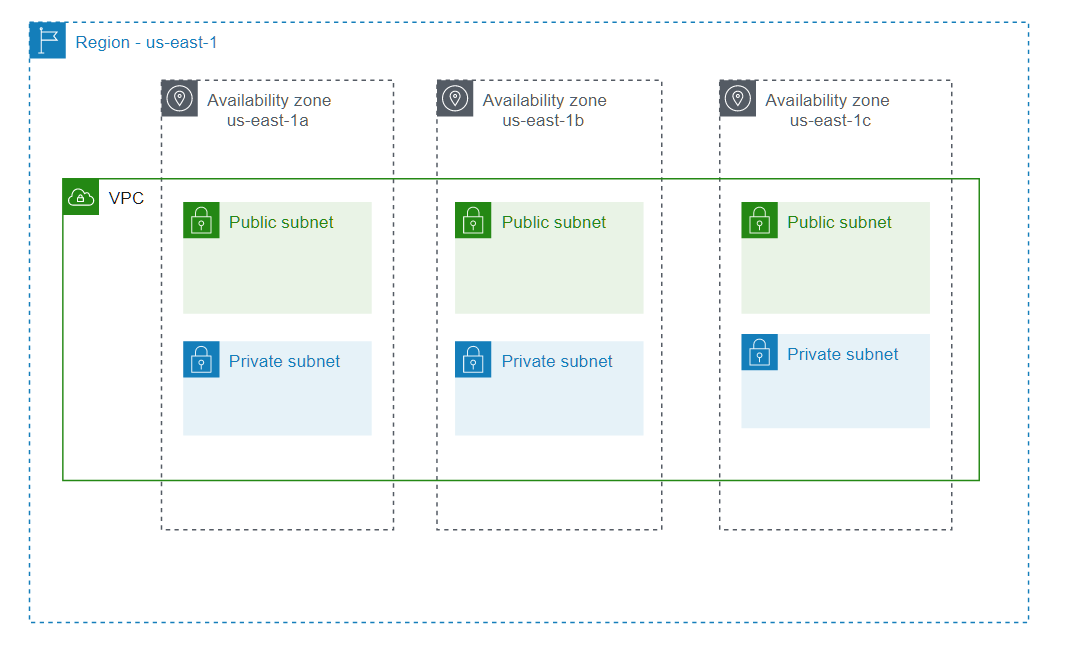AWS VPC or Amazon Virtual Private Cloud is a service that enables customers to launch their AWS resources in a virtual network that is logically isolated from other networks in the AWS cloud, and in some cases, even from the internet.
When creating a VPC, customers can define their own IP address range, subnets, and route tables, and have full control over their virtual network topology. They can also configure security groups and network ACLs to control access to their resources, and use a variety of network connectivity options, such as virtual private network (VPN) or AWS Direct Connect, to securely connect their VPC to their on-premises data centers or other networks.
AWS VPC enables customers to create a private and secure network environment for their AWS resources, and provides several benefits. The following are some of the reasons why an organization might choose to use VPC.
-
- Enhanced Security: VPC provides a secure environment for AWS resources, reducing the exposure of resources to the public internet, and improving overall security and compliance. This is especially important for organizations that handle sensitive data, such as financial or healthcare data.
- Customization: VPC provides complete control over network topology, IP address range, subnets, and route tables. This enables organizations to build customized network architectures that meet their specific needs, rather than being constrained by the limitations of a public cloud.
- Scalability: VPC is highly scalable and can support a large number of resources and workloads. This makes it ideal for organizations that require rapid scaling of resources to support business growth.
- Connectivity: VPC provides various connectivity options to securely connect to on-premises data centers or other networks, including VPN and AWS Direct Connect. This makes it easy for organizations to integrate their cloud infrastructure with their existing IT infrastructure.
- Cost Savings: VPC can help organizations save costs by reducing the need for additional network hardware and infrastructure. By using VPC, organizations can avoid the costs of maintaining their own physical network infrastructure, and can instead leverage the scalability and flexibility of the cloud.
Representation
A VPC is represented as shown in the following diagram. It can span across availability zones in a region.

Advantages of using VPC
-
- Enhanced Security: VPC provides a secure environment for AWS resources, reducing the exposure of resources to the public internet, and improving overall security and compliance.
- Customization: VPC provides complete control over network topology, IP address range, subnets, and route tables. This enables organizations to build customized network architectures that meet their specific needs.
- Scalability: VPC is highly scalable and can support a large number of resources and workloads. This makes it ideal for organizations that require rapid scaling of resources to support business growth.
- Connectivity: VPC provides various connectivity options to securely connect to on-premises data centers or other networks, including VPN and AWS Direct Connect. This makes it easy for organizations to integrate their cloud infrastructure with their existing IT infrastructure.
- Cost Savings: VPC can help organizations save costs by reducing the need for additional network hardware and infrastructure.
Disadvantages of using VPC
-
- Complexity: VPC can be complex to set up and configure, especially for organizations that are new to cloud computing.
- Management Overhead: VPC requires ongoing management and monitoring to ensure that it is functioning properly and that resources are being used efficiently.
- Latency: If the VPC is not configured properly, it can result in high latency, which can negatively impact the performance of applications.
- Network congestion: In a shared environment, network congestion can be a problem if multiple VPCs are competing for the same network resources.
- Cost: VPC can be expensive to set up and maintain, especially if organizations require multiple VPCs or if they need to connect to multiple data centers or networks.
Overall, the benefits of using VPC, such as enhanced security, customization, scalability, connectivity, and cost savings, outweigh the disadvantages for most organizations, and it is a critical component of most cloud infrastructures. VPC provides organizations with a flexible, scalable, and secure network infrastructure that enables them to build and deploy applications in the cloud, while also integrating with their existing IT infrastructure. This can help organizations to improve agility, reduce costs, and enhance overall business performance.
